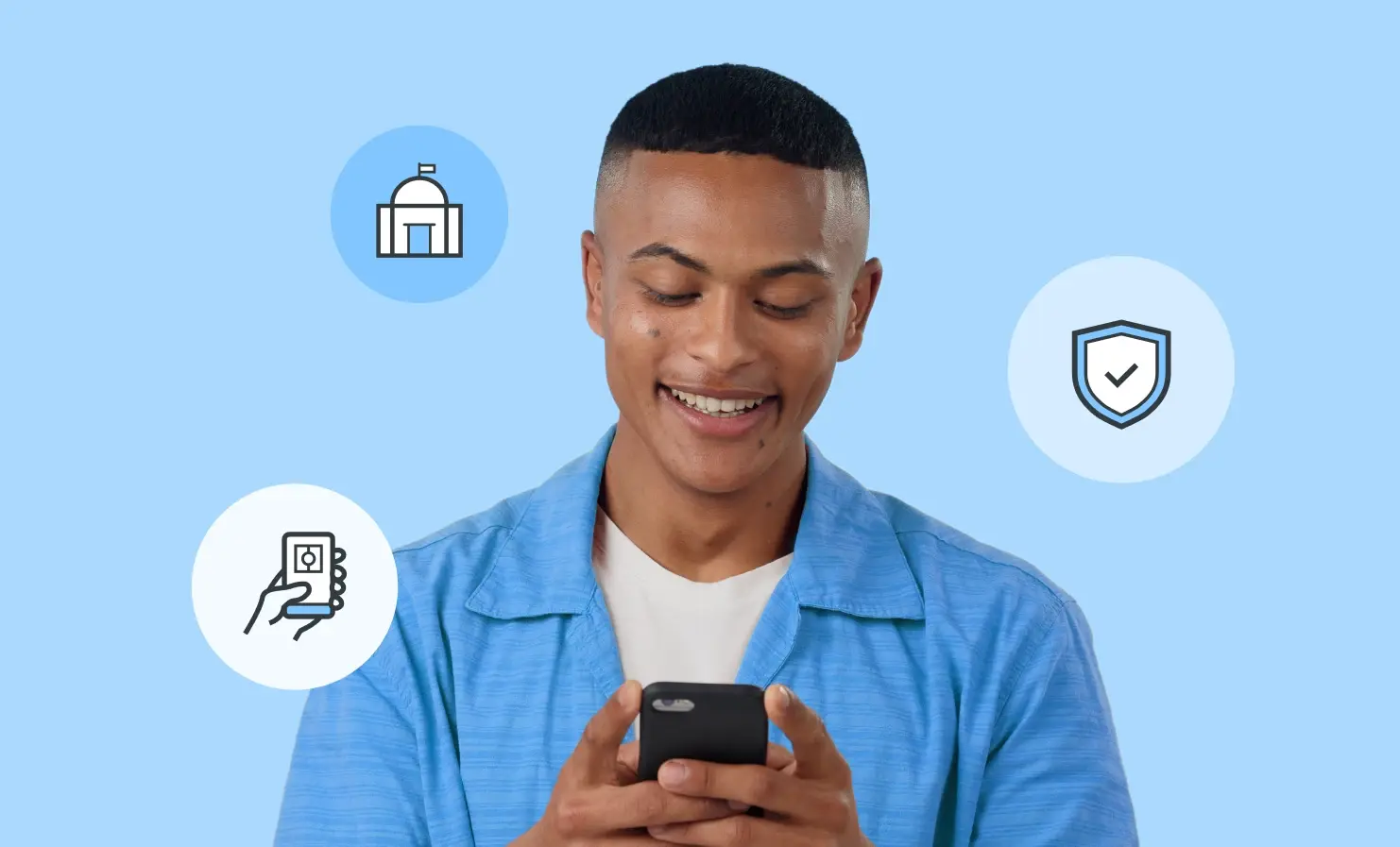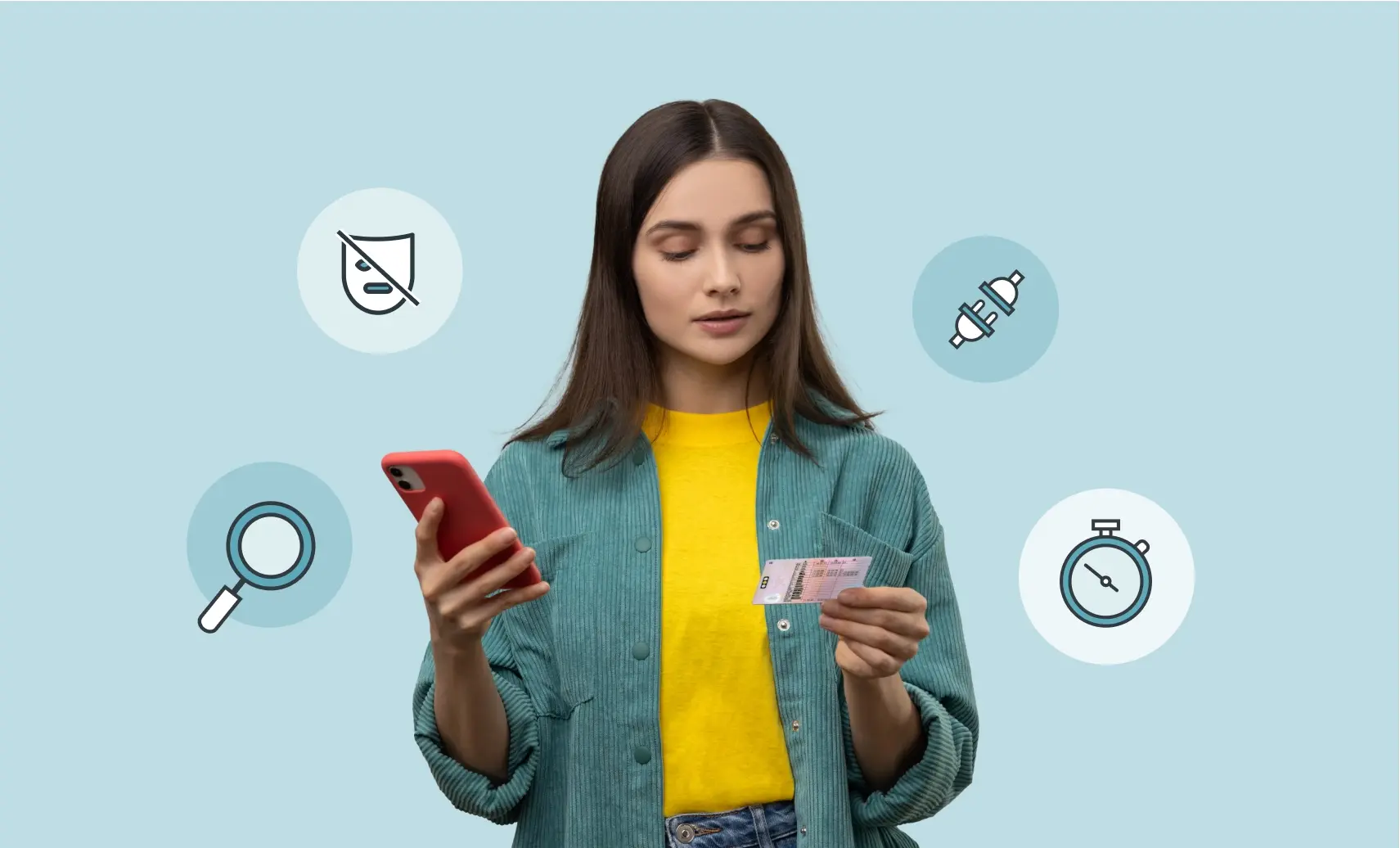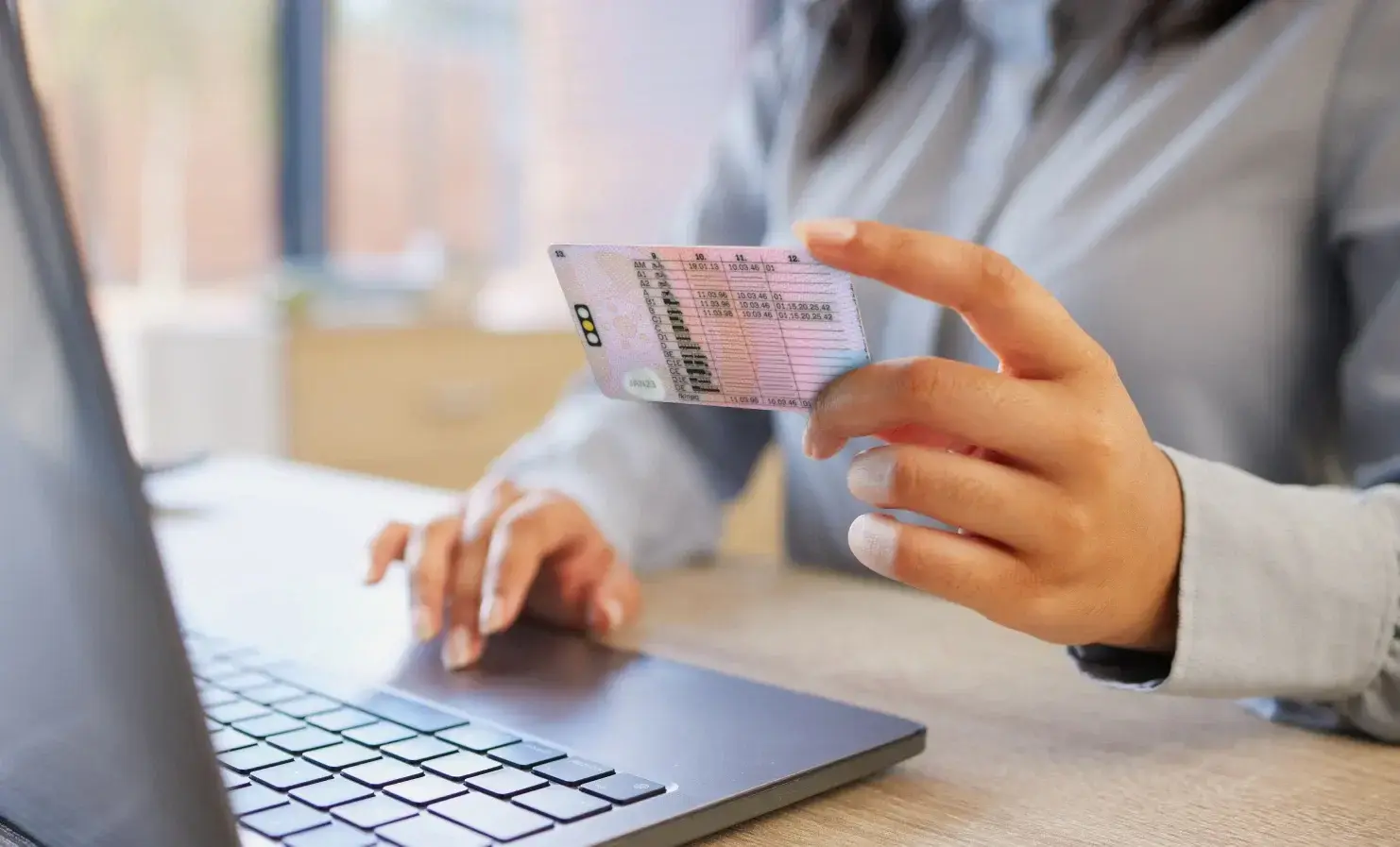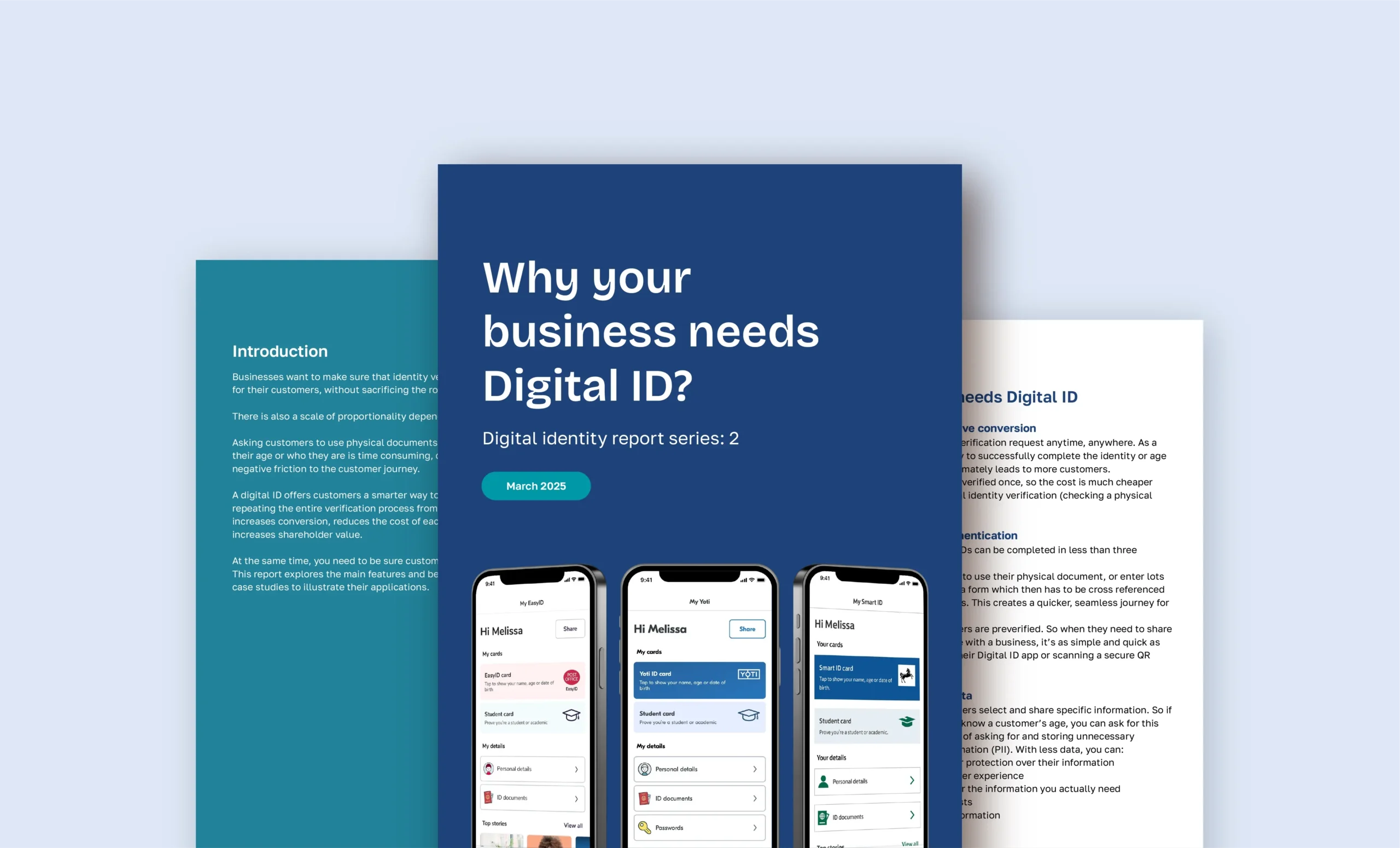
We’ve recently just hit a huge milestone: our Digital ID apps have had 14 million global downloads.
Businesses and individuals are increasingly using Digital IDs. In fact, experts have predicted that the number of digital identity verification checks will surpass 70 billion by the end of 2024. This blog explores how our Digital IDs are making people’s lives easier and more secure.
But first, what is Digital ID?
Instead of using a physical document, such as a passport or driving licence, a Digital ID is a way for people to prove who they are on their phone. Creating a Digital ID is easy – simply download any of the three Digital ID Connect apps – Yoti ID, Post Office EasyID or Lloyds Bank Smart ID. All three of our apps are accredited by PASS for proof of age.
From there, they can create their Digital ID by securely uploading an identity document and snapping a selfie. We accept thousands of documents from around the world and the app is available in 5 languages.
Once created, the user has a reusable Digital ID which can be used again and again to prove their age and identity. Only the user can access their details through biometric authentication or a 5-digit PIN. And our system is built to make it impossible for anyone other than the user to access their personal data.
Here’s some of the ways that people are using their Digital ID to safely and securely prove who they are.
Securely accessing government services
More of us are going online to complete everyday tasks. This includes accessing critical services such as healthcare, financial services and job opportunities. But to make sure that the appropriate services are offered to the correct people, online platforms need a way of confirming a user’s identity.
In 2018, we started working with the Improvement Service, the organisation for local government improvement in Scotland. We’ve helped them digitise the entire application process for National Entitlement Cards (NEC). Now, citizens can choose to prove their identity with a Digital ID. Not only has this reduced the turnaround time from 4-6 weeks to just 5 days, but it has also drastically reduced the manual processes that are usually required for identity verification.
Back in 2018, the Government of Jersey was looking for a way to deliver online public services through a single solution. Over 50% of the adult population of Jersey now choose to access social security, health and social services, income tax and driving licence applications using the Yoti app. Additionally, the Jersey Immigration and Customers Service allows those applying for the right to remain in Jersey to complete their identity and nationality verification checks remotely using Yoti.
Speeding up right to work and right to rent checks
When starting a new job or renting a new home, employers and landlords need to conduct right to work or right to rent checks. Often, this can be a cumbersome process that requires sending lots of personal information in ways that aren’t very secure. With a Digital ID, people can quickly share their details with their new employers and landlords, without worrying about the security of their personal data.
We partnered with Sterling in 2022 to revolutionise their background screening process. The following year, we launched a digital identity option to their clients, allowing candidates who verify their identity through Sterling and Yoti to create a reusable digital identity. After users have verified their identity once, they’re then able to securely share their details with businesses in seconds.
Since June 2022, we’ve completed over 1.6 million right to work checks and almost 1 million DBS (Disclosure and Barring Service) checks. Of these, 34% of UK adults choose to use a Digital ID for their DBS check and 23% chose to use a Digital ID for their right to work check.
Supporting young people to access financial services
Many young people struggle to prove their identity online. This is primarily because they’re either too young to have a driving licence, or don’t own, or have access to, a passport. At the age of 16, young people are at a critical point of being able to access some important services. But not owning, or having access to, identity documents can make this difficult as young people can’t prove who they are.
OneFamily, the UK’s largest Child Trust Fund provider, experienced this exact problem because at the age of 16, Child Trust Fund holders register to take over their account. We’ve partnered with them to make life easier for their 1.6 million Child Trust Fund account holders.
With a Digital ID, account holders can now securely access their Child Trust Fund account. At the age of 18, account holders can then move their funds and take action on their account.
Helping young people to prove their age
Young people have to prove how old they are more than most. But a significant problem for them is that they’re one of the groups in the UK who are most unlikely to have any form of photo ID.
One of the places that young people often get ID’d is at the cinema. Under the UK’s film classification system, those under a certain age can’t watch certain content. To enforce this, cinema staff are legally required to check people’s ages. This is an understandable source of frustration for cinema goers who often can’t prove how old they are, especially if their parents don’t want them taking their passport to the cinema.
In 2022, we partnered with the UK Cinema Association, who represents the interests of the vast majority of UK cinema operators. Over 800 cinema venues all over the UK now accept Digital IDs as proof of age, including Odeon, Cineworld and Vue.
Many students are also entitled to certain discounts. But they can only access these if they can prove that they qualify. To make this easier for students, we’re working with Translink, the main public transportation provider in Northern Ireland. Students aged between 13 and 16 years can use their Digital ID to prove how old they are. This allows them to purchase child fares at half the amount of a full priced ticket.
This month, we’ve also started working with National Express. With a verified ‘student’ credential, young people who are still in education can show their Student ID and purchase discounted tickets on all National Express buses.
Protecting children online
One of our key motivators is that we want to help build a better digital world. We’re committed to helping young people thrive in online environments in a safe and positive way.
It’s illegal for anyone to share sexual images or videos of someone under 18. To have a nude image removed from the internet, young people need to first prove that they’re under 18. Recognising this challenge, Childline and the Internet Watch Foundation (IWF) approached Yoti for a private way for young people to prove their age. They found that many young people were unwilling to report images of themselves as they didn’t want to reveal lots of personal information.
Young people can now prove their age safely and privately using a Digital ID. Once a young person has verified their age using their Digital ID, they can anonymously report the images and videos to the IWF via the Report Remove tool.
Improving data security
One of the main reasons that we started Yoti was to give people greater control of their data. The current way that most people prove their age or identity is by showing an identity document. But by doing this, they’re actually showing much more information that they need to.
A business selling age-restricted items only needs to know if the customer is old enough to purchase their goods. They don’t need to know someone’s full name or address. With our Digital IDs, the customer can simply show a verified “over 18” proof of age, and nothing more.
The same applies when someone is collecting a parcel. The postmaster or employee at the collection point doesn’t need to know details like someone’s date of birth or nationality. They just need to be certain that the correct person is collecting the parcel.
Our Digital IDs can be used in over 50,000 Post Offices, Payzone stores and convenience stores in the UK. This allows people to complete everyday tasks, like collecting parcels, by only showing the necessary information.
Building trust between everyday people
As we increasingly move online to connect with other people, it’s difficult to know if the person you’re talking to is who they say they are.
Online marketplaces have seen a huge increase in popularity over the last few years. Yet 55% of people aged between 16 and 24 have either been scammed themselves on secondhand marketplaces or know someone who has.
Digital IDs can enhance user verification and reduce the frequency of fake accounts, fostering trust in online communities. Recent research, conducted by Yoti and Censuswide, shows that 58% of respondents would consider using an app that verifies the identity details of buyers or sellers to boost their confidence when shopping via online marketplaces.
Similarly, another area where this is a significant problem is in the world of online dating. Although online dating can be exciting, people need to consider their safety when meeting someone they don’t know. In the last year alone, the National Fraud Intelligence Bureau (NFIB) received 8,792 reports of romance fraud. These losses amounted to over £94.7 million, with the average person losing £10,774. Additionally, 27% of people who use online dating services have been catfished in the last year.
Through our Digital ID apps, we offer peer to peer checks. Daters can swap details, such as a name or a photo, to verify one another. This information is verified from real identity documents which have undergone the necessary document authenticity checks by us.
Some dating sites instead choose to verify users’ identities themselves. Muslim Marriage Services introduced mandatory identity verification for people looking to connect. They realised that uploading identity documents could be a clunky process. So they chose to let users verify their identity with a Digital ID – simply, quickly and securely.
Online identity checks can build trust and transparency between people and contribute to safer in-person interactions. This can reduce the risk of fraudulent transactions and help improve safety when meeting people for the first time.
Embracing Digital IDs
Countries around the world, including Australia, Germany and the UK, are developing and implementing digital identity solutions, and they’re likely to become even more common in the future. Digital IDs have the potential to be used to access a wide range of services and opportunities, from opening bank accounts, renting properties and buying age-restricted items.
By accepting Digital IDs, organisations across various industries can enhance their efficiency, security and customer experience. And people have a smarter, privacy-preserving way of proving their age and identity.
To find out more about how you can use Digital IDs, please get in touch.



